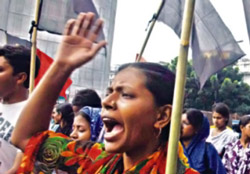WELCOME TO THE ARCHIVE (1994-2014) OF THE MAQUILA SOLIDARITY NETWORK. For current information on our ongoing work on the living wage, women's labour rights, freedom of association, corporate accountability and Bangladesh fire and safety, please visit our new website, launched in October, 2015: www.maquilasolidarity.org
May 25, 2006
 Simmering anger at poverty wages and poor working conditions has boiled over into massive worker protests in Bangladesh. Two workers are confirmed dead (informal reports speak of five), hundreds have been injured, and over a hundred factories have been set ablaze in riots over the past few days.
Simmering anger at poverty wages and poor working conditions has boiled over into massive worker protests in Bangladesh. Two workers are confirmed dead (informal reports speak of five), hundreds have been injured, and over a hundred factories have been set ablaze in riots over the past few days.
After a worker from FS factory in Gazipur (producing for among others for H&M, Gap, M&S, Inditex, Tesco and Next) was shot by the police, the fighting spread to the Savar Export Processing Zone and further. According to the European Clean Clothes Campaign (CCC), workers tended to single out factories where there had been problems including Universe Garments, Bandhu, Ringshine and A-One.
The protesters are calling for an end to low wages and long working hours. Given the unsafe conditions and the almost complete lack of respect for workers fundamental rights, particularly the right to organize and to bargain collectively (including the development of functional industrial relations and grievance mechanisms) it should come as no surprise that people take to the streets.
Instead of launching an immediate investigation into the root causes of the riots and measures to address them, as called for by the International Textile, Garment and Leather Workers' Federation (ITGLWF) and the CCC, the government had the police arrest several union officials, either in their offices or on the road (none of them at the protests). One leader was released on the evening of May 23, but the next day the Bangladesh Independent Garment Workers' Union Federation (BIGUF) received reliable information that all three of their staff members who were arrested had been blindfolded and severely beaten and tortured by the police.
According to the lawyer assisting them with the case, the arrested union leaders were given medical aid before they were brought to the court, and she personally saw the bruises and cuts. She also said that the court ordered that they remain in detention five more days for further questioning.
The BIGUF officers who were reportedly arrested at their union office in Gazipur at about 8:00 a.m. on May 23 have categorically denied taking part in the labour unrest. They are accused of vandalism, destruction of properties and labour unrest in the garment industry. Police also arrested Garments Workers Unity Forum President Moshrefa Mishu on May 23, reportedly while she was on her way to a press conference.
[NOTE: We are no longer requesting letters]
Please write to the Bangladeshi High Commissioner to Canada today and call for the immediate release of the imprisoned union officers. This is matter of great urgency.
[DATE]
His Excellency Mr. Rafiq Ahmed Khan, High Commissioner
High Commission for Bangladesh to Canada
275 Bank St, Suite 302
Ottawa, ON K2P 2L6
Fax: 613-567-3213
E-mail: bangla@rogers.com
Your Excellency High Commissioner Ahmed Khan:
I (my organization) was greatly shocked to learn that your government has arrested, beaten and tortured a number of union officials in relation to the worker protests of the past few days, which follows years of negligence of workers' rights.
I (my organization) call upon your government to immediately release those union leaders and launch an investigation in the root causes of the riots, focusing in particular on the following problems:
Sincerely,
[Your name]